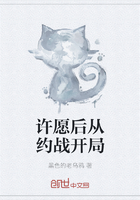Frescobaldi's men were in possession everywhere they had turned the cook out of her kitchen and the waitress out of her pantry;the reluctant Irishman at the door was supplemented by a vivid Italian,who spoke French with the guests,and said,"Bien,Monsieur,"and "toute suite,"and "Merci!"to all,as he took their hats and coats,and effused a hospitality that needed no language but the gleam of his eyes and teeth and the play of his eloquent hands.From his professional dress-coat,lustrous with the grease spotted on it at former dinners and parties,they passed to the frocks of the elder and younger Dryfoos in the drawing-room,which assumed informality for the affair,but did not put their wearers wholly at their ease.The father's coat was of black broadcloth,and he wore it unbuttoned;the skirts were long,and the sleeves came down to his knuckles;he shook hands with his guests,and the same dryness seemed to be in his palm and throat,as he huskily asked each to take a chair.Conrad's coat was of modern texture and cut,and was buttoned about him as if it concealed a bad conscience within its lapels;he met March with his entreating smile,and he seemed no more capable of coping with the situation than his father.They both waited for Fulkerson,who went about and did his best to keep life in the party during the half-hour that passed before they sat down at dinner.Beaton stood gloomily aloof,as if waiting to be approached on the right basis before yielding an inch of his ground;Colonel Woodburn,awaiting the moment when he could sally out on his hobby,kept himself intrenched within the dignity of a gentleman,and examined askance the figure of old Lindau as he stared about the room,with his fine head up,and his empty sleeve dangling over his wrist.March felt obliged to him for wearing a new coat in the midst of that hostile luxury,and he was glad to see Dryfoos make up to him and begin to talk with him,as if he wished to show him particular respect,though it might have been because he was less afraid of him than of the others.He heard Lindau saying,"Boat,the name is Choarman?"and Dryfoos beginning to explain his Pennsylvania Dutch origin,and he suffered himself,with a sigh of relief,to fall into talk with Kendricks,who was always pleasant;he was willing to talk about something besides himself,and had no opinions that he was not ready to hold in abeyance for the time being out of kindness to others.
In that group of impassioned individualities,March felt him a refuge and comfort--with his harmless dilettante intention of some day writing a novel,and his belief that he was meantime collecting material for it.
Fulkerson,while breaking the ice for the whole company,was mainly engaged in keeping Colonel Woodburn thawed out.He took Kendricks away from March and presented him to the colonel as a person who,like himself,was looking into social conditions;he put one hand on Kendricks's shoulder,and one on the colonel's,and made some flattering joke,apparently at the expense of the young fellow,and then left them.
March heard Kendricks protest in vain,and the colonel say,gravely:
"I do not wonder,sir,that these things interest you.They constitute a problem which society must solve or which will dissolve society,"and he knew from that formula,which the colonel had,once used with him,that he was laying out a road for the exhibition of the hobby's paces later.
Fulkerson came back to March,who had turned toward Conrad Dryfoos,and said,"If we don't get this thing going pretty soon,it 'll be the death of me,"and just then Frescobaldi's butler came in and announced to Dryfoos that dinner was served.The old man looked toward Fulkerson with a troubled glance,as if he did not know what to do;he made a gesture to touch Lindau's elbow.Fulkerson called out,"Here's Colonel Woodburn,Mr.Dryfoos,"as if Dryfoos were looking for him;and he set the example of what he was to do by taking Lindau's arm himself."Mr.Lindau is going to sit at my end of the table,alongside of March.Stand not upon the order of your going,gentlemen,but fall in at once."He contrived to get Dryfoos and the colonel before him,and he let March follow with Kendricks.Conrad came last with Beaton,who had been turning over the music at the piano,and chafing inwardly at the whole affair.At the table Colonel Woodburn was placed on Dryfoos's right,and March on his left.March sat on Fulkerson's right,with Lindau next him;and the young men occupied the other seats.
"Put you next to March,Mr.Lindau,"said Fulkerson,"so you can begin to put Apollinaris in his champagne-glass at the right moment;you know his little weakness of old;sorry to say it's grown on him."March laughed with kindly acquiescence in Fulkerson's wish to start the gayety,and Lindau patted him on the shoulder."I know hiss veakness.
If he liges a class of vine,it iss begause his loaf ingludes efen hiss enemy,as Shakespeare galled it.""Ah,but Shakespeare couldn't have been thinking of champagne,"said Kendricks.
"I suppose,sir,"Colonel Woodburn interposed,with lofty courtesy,"champagne could hardly have been known in his day.""I suppose not,colonel,"returned the younger man,deferentially.
"He seemed to think that sack and sugar might be a fault;but he didn't mention champagne.""Perhaps he felt there was no question about that,"suggested Beaton,who then felt that he had not done himself justice in the sally.
"I wonder just when champagne did come in,"said March.
"I know when it ought to come in,"said Fulkerson."Before the soup!"They all laughed,and gave themselves the air of drinking champagne out of tumblers every day,as men like to do.Dryfoos listened uneasily;he did not quite understand the allusions,though he knew what Shakespeare was,well enough;Conrad's face expressed a gentle deprecation of joking on such a subject,but he said nothing.















